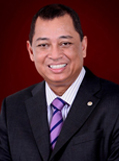
Pehin Dato Mohammad Yasmin Umar is the Minister of Energy at the Prime Minister's Office of Brunei Darussalam since May 2010. He is also the Director of the Defence Minister's Office and Directorate of Strategic Planning. Prior to serving as the Minister of Energy, he was the Deputy Minister of Defence since May 2005. Pehin Dato Mohammad Yasmin Umar graduated in 1981 with an MSc from the faculty of Electrical and Electronic Engineering. In 1986, he was awarded the certified Chartered Engineer (C Eng) insignia from the Institute of Chartered Engineers, and is a member of the Institute of Electrical Engineers, UK. In 2006, he was conferred the Most Honourable Order of Paduka Seri Mahkota Brunei, Second Class, which carries the title "Dato Paduka".
Q1. The 29th AMEM meeting was recently held in Brunei with the theme "ASEAN Connectivity". How will the public sector engage the private sector in order to fully realise the Master Plan on the ASEAN Connectivity vision, especially in the energy sector, given that this is the first meeting held since the adoption of the Master Plan by Asean Leaders last year?
Q2: The Trans-ASEAN Gas Pipeline Networks and ASEAN Power Grid have been pushed as two very significant and tangible contributors towards a more improved ASEAN connectivity. These ventures call for regional cooperation in pooling and maximising efficient utilisation of energy resources. What are the policy responses being taken to minimise the barriers hindering such regionalÂmarket integration?
Q3: With a MoU now signed with the International Energy Agency on energy cooperation, what are the areas and initiatives you feel would be most pertinent for ASEAN and IEA towards this end"Technology Prospects" on the ASEAN power generation sector. This ASEAN-IEA initiative will greatly enhance the development and deployment of clean energy technologies in the region towards a low carbon future.
Q4: One of the trends towards ensuring energy security and sustainability is exploring renewable energy sources. What are some of the latest ASEAN initiatives being undertaken in alternative energy, and what are your thoughts regarding nuclear energy for the Southeast Asian region, in light of the Fukushima crisis?
Q5: Brunei's current reliance on oil and gas as the sole sources of energy to generate income and provide a ready surplus of energy is not sustainable in the long term. What are the energy efficiency and conservation measures being put in place to address this?
YBP:Our total internal energy consumption is made up of 69 percent natural gas, mainly for power generation, and the remaining 31 percent from oil, mainly for transportation fuel. In 2010, we spent about 2 billion Brunei dollars on fuel expenditure. As the population is expected to grow at 2-3 percent per annum and sustain an economic growth of 3-6 percent per annum, the total fuel expenditure is predicted to increase to approximately 2.8 billion Brunei dollars by 2020 under a Business As Usual (BAU) scenario. This is clearly not sustainable for our small economy. Therefore, energy efficiency and conservation (EEC) is very high on our energy agenda.
On power generation, the main focus is to improve the national power generation efficiency from the current 23 percent to more than 45 percent in the future through operational excellence, asset rejuvenation, conversion of old open-cycle power plants to more efficient combined-cycle power plants, and reduction of losses from power transmission and distribution.
On the power demand side, we will intensify our energy-saving initiatives by promoting the use of high-efficiency electrical appliances such as air-conditioning/lighting and developing appropriate policies to implement appliances energy standards and labelling. On green buildings, structured energy audits are being carried out, especially on government buildings, to identify energy-saving best practices.
Energy managers will be appointed to monitor energy consumption in buildings, to ensure that energy-efficient practices are implemented. A pilot project on building energy management through public private partnership (ppp) will be carried out to analyse the consumption trend, and to recommend and implement measures to reduce energy consumption. A new electricity tariff structure for residential customers will also be introduced in January 2012, which, among other things, will encourage residents to save energy.
It is estimated that under the green scenario, the internal energy consumption for Brunei Darussalam could potentially be reduced to 1.7 billion Brunei dollars per annum by 2020.
By: Energy Market Authority (Singapore)